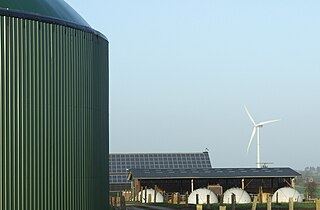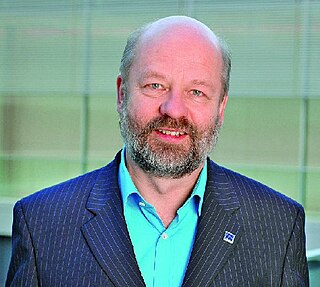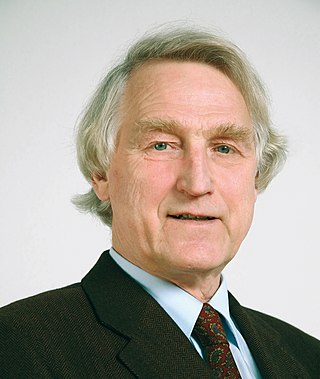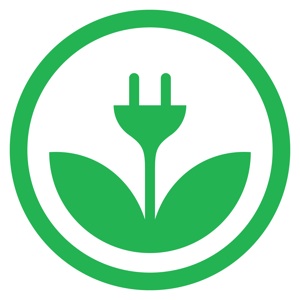
Renewable energy in Germany is mainly based on wind and biomass, plus solar and hydro. Germany had the world's largest photovoltaic installed capacity until 2014, and as of 2023 it has over 82 GW. It is also the world's third country by installed total wind power capacity, 64 GW in 2021 and second for offshore wind, with over 7 GW. Germany has been called "the world's first major renewable energy economy".

Hermann Scheer was a Social Democrat member of the German Bundestag (parliament), President of Eurosolar and General Chairman of the World Council for Renewable Energy. In 1999, Scheer was awarded the Right Livelihood Award for his "indefatigable work for the promotion of solar energy worldwide".

Hans-Josef Fell is a German former politician who was a member of the German Bundestag from 1998 to 2013. A member of Alliance 90/The Greens, he co-authored the 2000 draft of the Renewable Energy Sources Act alongside Hermann Scheer, establishing the foundation for the technology developments in photovoltaic, biogas, wind power and geothermal energy in Germany. Fell is founder and president of the Energy Watch Group and an internationally renowned energy and climate change advisor, author and speaker.
Preben Maegaard, was a Danish renewable energy pioneer, author and expert. Since the oil crisis in 1974 he worked for the transition from fossil fuels to renewable energy. Preben Maegaard was co-founder of the Nordic Folkecenter for Renewable Energy, established in 1983, and its director 1984 till 2013 (www.folkecenter.net).

Energy in Germany is obtained for the vast majority from fossil sources, accounting for 77.6% of total energy consumption in 2023, followed by renewables at 19.6%, and 0.7% nuclear power. As of 2023, German primary energy consumption amounted to 10,791 Petajoule, making it the ninth largest global primary energy consumer. The total consumption has been steadily declining from its peak of 14,845 Petajoule in 2006. In 2023 Germany's gross electricity production reached 508.1 TWh, down from 569.2 TWh in 2022, and 631.4 TWh in 2013.
Martin Vosseler was a Swiss renewable energy advocate, co-founder of the organization Physicians for Social Responsibility, who has been a renewable energy advocate since 1981. After giving up his medical practice in 1995, he began working full-time to raise awareness of the benefits of renewable energy use, by traveling around the world. From 16 October 2006 to 8 May 2007, Vosseler and his crew made history by completing the first trans-Atlantic crossing in a motorized boat, using solar power only. Vosseler received a special prize from Eurosolar.

Joachim Luther received his PhD in experimental physics at the Leibniz University Hannover in 1970.

Between 1992 and 2023, the worldwide usage of photovoltaics (PV) increased exponentially. During this period, it evolved from a niche market of small-scale applications to a mainstream electricity source. From 2016-2022 it has seen an annual capacity and production growth rate of around 26%- doubling approximately every three years.

Eurosolar - European Association for Renewable Energies is a German association with headquarters in Bonn. The association has sections in 13 countries.
The International Hydropower Association (IHA) is an international lobby group and membership association representing the global hydropower sector.

Rolf Disch is a German architect, solar energy pioneer and environmental activist. Born in Freiburg im Breisgau, Germany, Disch has dedicated particular focus to regional renewable and sustainable energy.

EKOenergy is a globally active nonprofit ecolabel for renewable energy. It is owned by the Finnish Association for Nature Conservation and managed in cooperation with other environmental NGOs.
WREN is a major non-profit organization registered in the United Kingdom with charitable status and affiliated to UNESCO, the Deputy Director General of which is its honorary President. It has a Governing Council, an Executive Committee and a Director General. It maintains links with many United Nations, governmental and non-governmental organisations.

Ursula Sladek is a German environmentalist, founder and former president of Schönau Electricity Works, a "registered cooperative society" under German Law in Schönau, Germany, that provides electricity from renewable sources.

Louis Palmer is a Swiss keynote speaker, global environmental adventurer, and "Solar Pioneer".

Jochen Wermuth is a German climate impact investor, who serves on the steering committee of the "DivestInvest" investor association to which asset owners and managers with some $40 trillion of assets have committed as of 2021. He is the founder and Chief Investment Officer of Wermuth Asset Management, a German family office and investment advisory firm committed to sustainable investments. From June 2017 until his resignation on 19 February 2024 he was also a member of the investment committee for the EUR 24 billion German Sovereign Wealth Fund KENFO.
Renewable energy in Greece accounted for 29 percent of its electricity from renewable sources in 2021. By 2030, renewables are expected to have a capacity of 28GW, and exceed 61 percent of Greece's electricity consumption. This is a significant increase from 8% of the country's total energy consumption in 2008. By 2022, Greece occasionally reached 100% renewables for a few hours. The target for 2050 is a capacity of 65GW.

The International Renewable Energy Agency (IRENA) is an intergovernmental organization mandated to facilitate cooperation, advance knowledge, and promote the adoption and sustainable use of renewable energy. It is the first international organisation to focus exclusively on renewable energy, addressing needs in both industrialised and developing countries. It was founded in 2009 and its statute entered into force on 8 July 2010. The agency is headquartered in Masdar City, Abu Dhabi. The Director-General of IRENA is Francesco La Camera, a national of Italy. IRENA is an official United Nations observer.
Neela Winkelmann-Heyrovská is a Czech academic, environmental activist and government official. She was the founder and first managing director of the Platform of European Memory and Conscience, an educational project of the European Union bringing together government institutions and NGOs from countries of Europe and North America active in research, documentation, awareness raising and education about the crimes of totalitarian regimes, in 2011-2018.
The European Becquerel Prize for Outstanding Merits in Photovoltaics is a prize to honour scientific, technical or managerial merits in the field of photovoltaic solar energy. It has been established in 1989 by the European Commission at the occasion of the 150th anniversary of a groundbreaking experiment by Alexandre-Edmond Becquerel, also known as Edmond Becquerel, in which he discovered the photovoltaic effect. The prize is awarded to a single individual who is recognized for continuous achievements in the field of photovoltaic energy conversion. The prize is primarily a European award but not restricted exclusively to European citizens. The prize is granted by the European Commission. The Becquerel Prize Committee selects the individual to be honoured.












